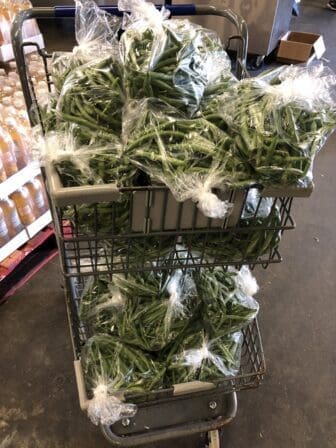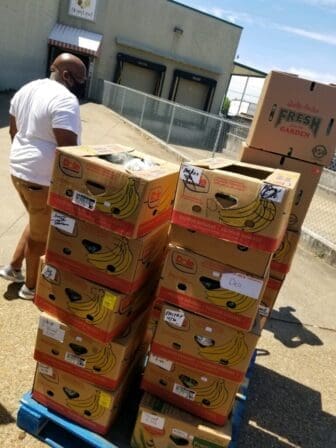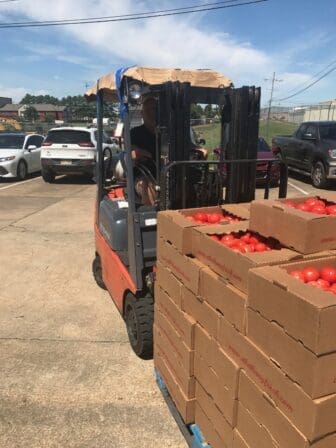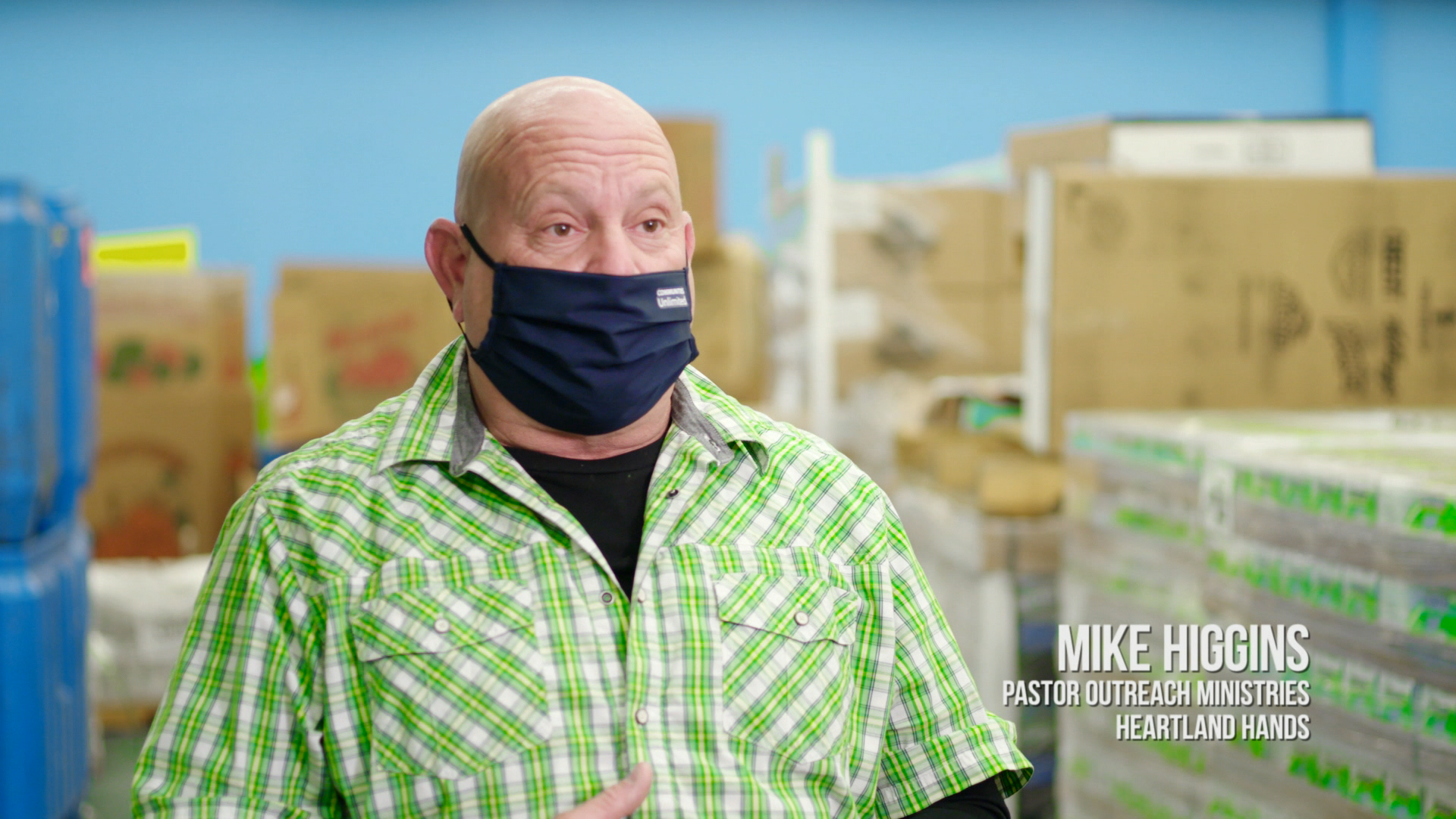Farm To Food Pantry
The COVID-19 pandemic created chaos for food supply chains. Some of the hardest hit were small-grow farmers, many of whom relied on selling their fresh produce to local schools and restaurants for a steady income. Those locations closed because of orders from the governors’ office to slow the spread of the virus. Farmers and the general public felt the loss as families struggled to feed their children without the help of school meals or local restaurants.
 Brenda Williams, Healthy Foods Coordinator, saw the need on both sides and developed an idea that would benefit both farmers and families, the Farm to Food Pantry Project. The result was a highly successful program that allowed local farms to find a market for their produce and distribute fresh produce to food pantries throughout rural Mississippi.
Brenda Williams, Healthy Foods Coordinator, saw the need on both sides and developed an idea that would benefit both farmers and families, the Farm to Food Pantry Project. The result was a highly successful program that allowed local farms to find a market for their produce and distribute fresh produce to food pantries throughout rural Mississippi.
The Mary Reynolds Babcock Foundation gave Communities Unlimited a grant for $200,000 to purchase produce at fair market prices. On June 2, 2020, St. Bethany Fresh from Pontotoc, MS, Lockard Produce from Glimp, TN, The Produce Tribe from Stanton, TN, Rose Creek Farms from Selmer, TN made the first delivery. By the end of the program, Communities Unlimited, with Heartland Hands Foodbank’s assistance, had distributed 80,000 pounds of fresh produce throughout Mississippi and Arkansas.
Filling the Void
Communities Unlimited began its healthy foods initiative in March 2016 when USDA selected it as one of the value-chain coordinators. By that fall, Brenda Williams, Healthy Foods Coordinator, took the initiative’s reins and began building the program. When the COVID-19 pandemic hit, small-scale farmers took a hard hit. Many of the farmers sold fresh produce to schools, restaurants and farmer’s markets. When the pandemic spread nationwide, many restaurants and schools closed to keep the virus from spreading, eliminating most markets for many small-scale farmers.
Brenda spoke with regional farmers in Arkansas, Mississippi, and Tennessee. She learned many farmers were throwing away their crops because they had no place to sell them. She wanted to develop a way to assist the farmers and those who needed the food when unemployment and reduced hours had severely strained income for many Americans.
needed the food when unemployment and reduced hours had severely strained income for many Americans.
Brenda turned to Communities Unlimited CEO Ines Polonius with an idea — find a way to purchase the crops from the small-scale farmers and give the produce to those in need through local food banks and pantries.
Ines was enthusiastic about the plan and worked with a potential funder to make the idea a reality.
By May 2020, the Mary Reynolds Babcock Foundation had stepped up. The foundation provided $200,000 for Communities Unlimited’s Farm to Food Pantry Project, which aimed to purchase produce from small-scale growers and keep them from going out of business.
The Mary Reynolds Babcock Foundation grant allowed Communities Unlimited to immediately began working with small-scale farmers in the Mississippi River Delta to purchase produce. The farmers first delivered produce to Heartland Hands Food Bank in Southaven, MS, then distributed to a Mississippi food pantry network. Communities Unlimited used the $200,000 to purchase produce at fair market prices determined by the farmers, with the invoices paid within ten days.
From the Farm to the Food Pantry
Four farms from the Mississippi Delta delivered the first locally grown produce purchased on June 2, 2020. Communities Unlimited collaborated with the HeartLand Hands Food Pantry, Inc., to distribute the produce to HeartLand Hands’ network of 29 food pantries and 40 agencies in 42 counties in Mississippi.
Four farms participated in the initial delivery:
- Bethany Fresh from Pontotoc, MS
- Debra Lockard of Lockard Produce from Glimp, TN
- Matthew Robinson of The Produce Tribe from Stanton, TN
- Ray Tyler of Rose Creek Farms from Selmer, TN
 The program provided welcome relief for farmers such as Ray Tyler. The owner of Rose Creek Farms in Selmer, Tennessee, Tyler had been selling his produce to local restaurants. When those restaurants closed, his income dropped significantly. The Farm to Food Pantry project changed that.
The program provided welcome relief for farmers such as Ray Tyler. The owner of Rose Creek Farms in Selmer, Tennessee, Tyler had been selling his produce to local restaurants. When those restaurants closed, his income dropped significantly. The Farm to Food Pantry project changed that.
“It has come at a very timely manner, as we lost our wholesale restaurant accounts,” Tyler said. “We are very grateful to be part of the program, as we were able to keep our team employees this past season.”
Debra Lockard of Lockard Produce faced a similar fate. But she had worked with Communities Unlimited for years. Working with Communities Unlimited, Debra obtained her Good Agricultural Practices (GAP) certification from the USDA, a certification required by most groceries, food distributors, schools and hospitals.
Debra’s business was thriving. She sold sweet and red potatoes, bitter melons, purple hull peas, okra, cucumbers, squash, banana and jalapeno peppers, herbs, and tomatoes to the Shelby County School District in Memphis as well as groceries, restaurants, and other large produce purchasers.
But most of her business came almost to a complete standstill with COVID-19, leaving Debra in need of alternate markets. “My previous contracts with schools and restaurants were canceled due to closure,” she said. “Participating in the [Farm to] Food Pantry Project has allowed me to continue my production needs of vegetables.”
By August, the program expanded into Arkansas. Vera’s Heritage Farm in Proctor, Arkansas, began delivering fresh produce to the Good Neighbor Love Center in West Memphis, Arkansas. The center provided food to almost 200 families. By September, HeartLand Hands had distributed more than 80,000 pounds of locally grown fruits and vegetables through the Farm to Food Pantry Project.
 “Thanks to you and your program, we, for the first time in our history, have access to an abundance of local farm-fresh produce that has literally affected thousands of hungry people all across the state of Mississippi,” said Pastor Mike Higgins of HeartLand Hands wrote to Communities Unlimited.
“Thanks to you and your program, we, for the first time in our history, have access to an abundance of local farm-fresh produce that has literally affected thousands of hungry people all across the state of Mississippi,” said Pastor Mike Higgins of HeartLand Hands wrote to Communities Unlimited.
The program worked so well for HeartLand Hands that Pastor Mike suggested expanding to other pantries. He connected Brenda with Ray Chandler of the Osceola McCarty Youth Development Center, a food bank in Hattiesburg, Mississippi.
In September, the center received its first of three deliveries of cucumbers from St. Bethany Fresh Farm. The center received about 6,000 pounds of fresh produce as part of the Farm to Food Pantry program.
As the 2020 growing season wound down, so does the program. The program was a huge success for the farmers and the food pantries.

